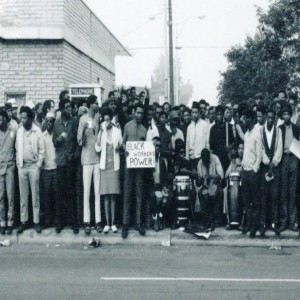
On this day in labor history, the year was 1968.
That was the day 4000 autoworkers at Chrysler’s Dodge Main plant in Hamtramck, Michigan walked out in a wildcat strike.
They protested assembly line speed-up but also racist foremen and the firings of seven coworkers.
The strike was significant for many reasons.
It injected Black Power politics within the union movement.
The CIO had made unprecedented gains in the 30s and 40s through interracial organizing and combating Jim Crow on the job.
However, racial discrimination persisted in industries across America.
The wildcat shocked the UAW leadership, having prided itself on its early and central involvement in the Civil Rights Movement.
By 1968, many African-Americans grew frustrated with the slow pace of reform and found the militancy of the Black Power movement attractive.
According to historian Robert Weir, black autoworker activists considered many UAW officials “paternalistic, condescending and out of touch with changing urban realities.”
Many of their white coworkers joined them on the picket lines.
Black activists at Dodge Main condemned the UAW for failing to address the disproportionate racial discrimination they faced on the job.
They demanded a separate contract that spoke to the needs of black workers and the right to bargain directly with the company.
The wildcat immediately grew into the Dodge Revolutionary Union Movement and inspired similar groupings at area auto plants.
Those white workers who were initially sympathetic, worried that DRUM demands would serve to weaken and ultimately split the union movement along racial lines.
DRUM would continue to demand safer working conditions, shorter hours and higher wages, an end to the Vietnam War and more black union officials and supervisors.
The movement was short-lived but continues to be revered among Detroit activists today.
More Episodes
 2024-07-18
2024-07-18
 2024-07-17
2024-07-17
 2024-07-16
2024-07-16
 2024-07-15
2024-07-15
 2024-07-14
2024-07-14
 2024-07-13
2024-07-13
 2024-07-12
2024-07-12
 2024-07-10
2024-07-10
 2024-07-09
2024-07-09
 2024-07-08
2024-07-08
 2024-07-06
2024-07-06
 2024-07-05
2024-07-05
 2024-07-03
2024-07-03
 2024-07-02
2024-07-02
 2024-07-01
2024-07-01
Create your
podcast in
minutes
- Full-featured podcast site
- Unlimited storage and bandwidth
- Comprehensive podcast stats
- Distribute to Apple Podcasts, Spotify, and more
- Make money with your podcast
It is Free
- Privacy Policy
- Cookie Policy
- Terms of Use
- Consent Preferences
- Copyright © 2015-2024 Podbean.com




